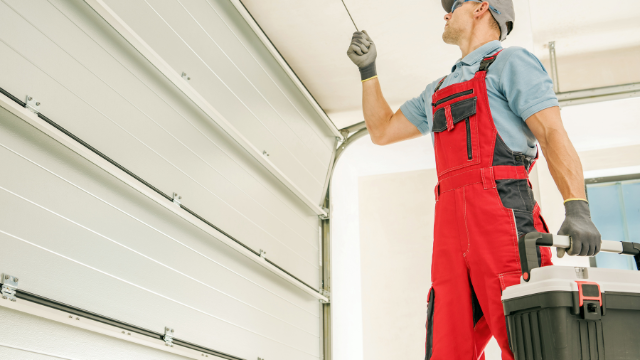If you’ve ever wondered what your garage door is made of, you’re in the right place. In this article, we’ll explore the various materials used to create garage doors. From durable steel to classic wood, lightweight aluminum to resilient fiberglass, and even modern options like vinyl and composite, we’ll delve into the technical details of each. By the end, you’ll have a comprehensive understanding of what garage doors are made of and which material might be best for your needs.
Steel
Steel is a popular material for garage doors because it is durable and can withstand various weather conditions. The durability of steel makes it an excellent choice for homeowners looking for a long-lasting and low-maintenance option. Steel garage doors are designed to resist dents, scratches, and other forms of damage, ensuring that they remain in top condition for years to come. Additionally, steel doors are highly resistant to rust and corrosion, making them suitable for areas with high humidity or frequent exposure to moisture.
One of the key advantages of steel garage doors is their cost-effectiveness. Compared to other materials like wood or aluminum, steel is generally more affordable. This makes it an attractive option for budget-conscious homeowners who want a durable and reliable garage door without breaking the bank. Moreover, steel doors require minimal maintenance, reducing long-term costs associated with repairs or replacements.
When it comes to the cost of steel, it’s important to note that there are different types and grades available. Higher-grade steel, such as galvanized steel or stainless steel, tends to be more expensive due to its superior resistance to rust and corrosion. However, even lower-grade steel doors can offer sufficient durability and weather resistance at a more affordable price point.
Wood
Wooden garage doors are a popular choice due to their durability, requiring minimal maintenance compared to other materials. With proper care, wooden doors can withstand harsh weather conditions and last for many years. Additionally, wooden doors add a touch of natural beauty and warmth to the exterior of your home.
Durability of Wooden Doors
To ensure long-lasting performance, opt for a garage door made of wood. Wooden doors offer several benefits and are known for their durability. Here are three reasons why wooden doors are a reliable choice for your garage:
- Natural Strength: Wood is a strong material that can withstand heavy impacts and resist damage. It can endure harsh weather conditions, such as extreme temperatures and high winds, without losing its structural integrity.
- Enhanced Insulation: Wooden doors provide excellent insulation, helping to regulate the temperature inside your garage. This insulation not only keeps your space comfortable but also reduces energy costs by minimizing heat loss or gain.
- Customization Options: Wood offers a wide range of design options, allowing you to create a garage door that matches your aesthetic preferences. From different wood species to various finishes and stains, you can personalize your door to complement the overall look of your home.
Maintenance Requirements for Wood
Maintaining a wood garage door is essential to ensure its longevity and performance. Wood requires regular maintenance to prevent rot and protect against pests. Here are some key maintenance requirements for wood garage doors:
| Maintenance Task | Frequency | Description |
|---|---|---|
| Inspect for damage | Annually | Check for cracks, warping, or signs of rot. |
| Clean and wash | Biannually | Remove dirt, debris, and mildew using a mild detergent and soft brush. Rinse thoroughly. |
| Apply protective finish | Every 2-3 years | Apply a wood sealant or paint to protect against moisture and UV damage. |
| Lubricate moving parts | Biannually | Use a silicone-based lubricant to keep hinges, rollers, and tracks working smoothly. |
Aesthetics of Wooden Doors
To enhance the visual appeal of your garage, consider the various options available for wooden doors. Wood door designs offer a timeless and elegant look that can greatly enhance the overall aesthetic of your home. Here are three benefits of choosing wooden doors for your garage:
- Natural beauty: Wooden doors have a warm and inviting appearance that adds a touch of natural beauty to your garage. The unique grain patterns and rich colors of different wood species can create a stunning focal point.
- Versatility: Wooden doors can be customized to fit any architectural style or personal preference. Whether you prefer a classic carriage house design or a modern sleek look, there are endless options available to match your style.
- Durability: Contrary to popular belief, wooden doors are highly durable when properly maintained. With regular sealing and maintenance, wooden doors can withstand the elements and last for many years.
Investing in a wooden garage door not only adds curb appeal to your home but also provides a durable and versatile option that can withstand the test of time.
Aluminum
Aluminum is a popular material for garage doors due to its lightweight and durable nature. When it comes to durability, aluminum garage doors are highly resistant to rust and corrosion, making them an excellent choice for areas with high humidity or coastal regions. Unlike wooden doors, aluminum doors do not warp, crack, or rot over time, further enhancing their durability and longevity. Moreover, aluminum doors require minimal maintenance, saving you time and effort in the long run.
In terms of cost, aluminum garage doors are generally more affordable compared to other materials like wood or steel. The lower cost of aluminum makes it a cost-effective option for homeowners looking to replace their garage doors without breaking the bank. Additionally, aluminum doors are relatively easy to install, which can further reduce installation costs.
Despite its lightweight nature, aluminum is a sturdy material that provides adequate security for your garage. Its strength and durability make it resistant to dents and dings, ensuring that your garage door remains in good condition for years to come.
Fiberglass
Fiberglass garage doors offer several advantages and disadvantages. On one hand, they are known for their durability and resistance to dents, rust, and corrosion. Additionally, fiberglass doors require minimal maintenance and can be easily cleaned with soap and water. However, it’s important to note that fiberglass doors are prone to cracking and fading over time, especially when exposed to harsh weather conditions.
Pros and Cons
When choosing a garage door material, considering the pros and cons of fiberglass can help you make an informed decision. Fiberglass garage doors have several advantages and disadvantages that you should be aware of. Here are the key points to consider:
- Pros:
- Lightweight: Fiberglass doors are lighter than other materials, making them easier to install and operate.
- Low maintenance: They require minimal upkeep and are resistant to rot, rust, and insect damage.
- Energy efficient: Fiberglass has good insulation properties, helping to regulate temperature and reduce energy costs.
- Cons:
- Fragility: While fiberglass is durable, it can crack or break upon impact.
- Limited design options: Fiberglass doors have fewer design choices compared to other materials like steel or wood.
- Higher cost: Fiberglass doors tend to be more expensive upfront compared to some other materials.
Considering these pros and cons, you can weigh the benefits and drawbacks of fiberglass garage doors against your specific needs and budget.
Durability and Maintenance
To ensure the longevity and easy upkeep of your garage door, you’ll want to consider the durability and maintenance of fiberglass. When it comes to durability, fiberglass garage doors are a popular choice due to their resistance to dents, cracks, and warping. They are also highly resistant to moisture, making them ideal for areas with high humidity or frequent rain. In terms of maintenance, fiberglass garage doors require minimal upkeep. They do not require regular painting or staining, unlike wooden doors, and can be easily cleaned with soap and water. However, it’s important to note that fiberglass garage doors can be more expensive compared to other types of garage door materials. Nevertheless, the durability and low maintenance requirements of fiberglass make it a worthwhile investment in the long run.
Vinyl
Vinyl is a popular material used for garage doors due to its durability and low maintenance requirements. Here are three key points to consider about vinyl garage doors:
- Vinyl longevity: Vinyl garage doors are known for their long lifespan. The material is resistant to cracking, warping, and fading, making it a reliable choice for homeowners. Vinyl doors are also less susceptible to damage from extreme temperature changes, which can be a concern in some climates. With proper care and maintenance, vinyl garage doors can last for many years.
- Vinyl installation process: Installing a vinyl garage door requires expertise and precision. The process involves measuring the opening, preparing the framing, and aligning the tracks and panels. The installation also includes attaching the springs, cables, and other hardware to ensure proper functionality. It is recommended to hire a professional installer to ensure a seamless and secure installation.
- Design options: Vinyl garage doors offer a wide range of design options to suit various architectural styles. They come in different colors, textures, and finishes, allowing homeowners to choose a look that complements their home’s exterior. Some vinyl doors even mimic the appearance of wood, providing a cost-effective alternative to real wood doors.
Composite
Composite garage doors, on the other hand, offer homeowners another durable and versatile option. These doors are made from composite materials, which are a combination of different materials such as wood fibers and recycled plastics. The use of composite materials in garage doors provides several advantages. Firstly, composite materials are highly durable and resistant to weathering, making them an excellent choice for outdoor applications like garage doors. They are also less likely to warp, crack, or rot compared to other materials, ensuring a longer lifespan for your garage door.
In addition to their durability, composite garage doors are also environmentally friendly. The use of recycled plastics in the manufacturing process helps reduce waste and minimize the environmental impact of production. Furthermore, composite materials are often lighter than traditional materials like wood or steel, resulting in lower energy consumption during transportation and installation.
When it comes to aesthetics, composite garage doors can be designed to mimic the look of natural wood, giving your home a classic and elegant appearance without the maintenance requirements of real wood. With their durability, versatility, and environmental benefits, composite garage doors are an excellent choice for homeowners looking for a long-lasting and eco-friendly option for their garage.






